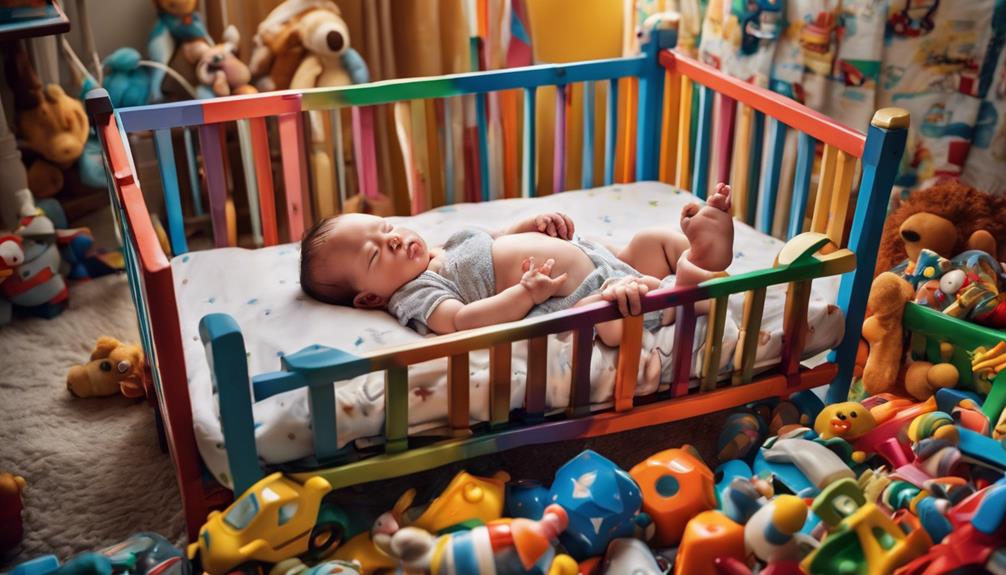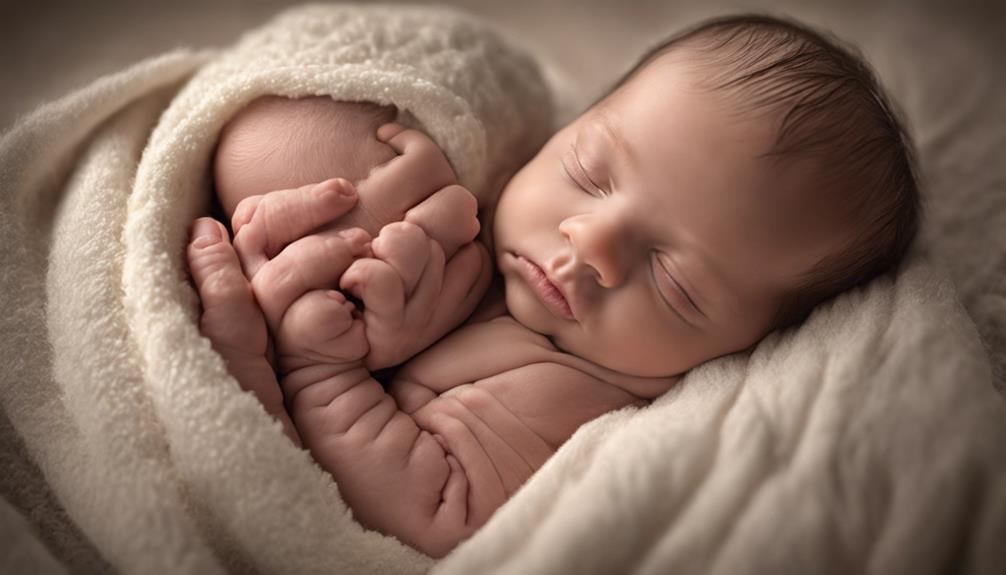Have you ever wondered why our precious little ones seem to resist sleep so much? Let’s delve into the reasons why newborns often struggle with bedtime.
From the classic hunger ploy to more nuanced factors like discomfort or teething troubles, there's a myriad of reasons that could be causing our little ones to resist the land of nod. But fear not, dear parents, for understanding these underlying causes is the first step towards reclaiming those peaceful nights we all long for.
So, grab a cup of coffee and let's explore the fascinating world of infant sleep struggles together.
Key Takeaways
- Separation anxiety triggers resistance to sleep in newborns, especially around six months.
- Overtiredness leads to difficulty settling for sleep, highlighting the importance of a consistent routine.
- Overstimulation disrupts sleep; establishing a calming bedtime routine aids in relaxation.
- Teething discomfort can cause sleep disruptions; using teething toys can help alleviate pain.

Dreamegg Portable Noise Machine for Baby Adult, Features Powerful Battery, 21 Soothing Sound, Noise Canceling for Office & Sleeping, Sound Therapy for Home, Travel, Registry Gift, Classic White
【COMPACT BUT POWERFUL】- D11 Max has more skills. Designed for all things sleep, this sound machine comes with…
As an affiliate, we earn on qualifying purchases.
As an affiliate, we earn on qualifying purchases.
Separation Anxiety as a Cause
Separation anxiety in newborns often manifests as a resistance to sleep, stemming from their fear of being alone. It's heart-wrenching to witness our little ones cry at bedtime, struggling with the idea of being apart from us. This fear is a common experience, especially around six months when babies hit a developmental milestone that triggers this anxiety. Understanding that this behavior is a sign of their healthy attachment to us can bring comfort amidst the sleepless nights.

Mommy's Bliss Organic Little Gums Soothing Massage Gel Day and Night Combo, Great for Teething Babies, Age 2 Months+, Sugar Free, Mild & Sweet Flavor, 2-0.53 Oz Tubes (Pack of 1)
Organic Teething Relief with Natural Ingredients: Tender gums call for loving care, not nasty additives; that's why we…
As an affiliate, we earn on qualifying purchases.
As an affiliate, we earn on qualifying purchases.
Overtiredness and Sleep Resistance

When newborns experience overtiredness, they may exhibit resistance to sleep, making it challenging to settle down and relax their bodies. Overtired newborns can become more fussy, irritable, and have difficulty falling asleep, leading to disrupted sleep patterns.
To address this issue effectively, consider the following:
- Establish a Consistent Sleep Routine: Creating a predictable bedtime routine can help regulate your newborn's sleep patterns, reducing the likelihood of overtiredness and sleep resistance.
- Recognize Signs of Tiredness: Understanding your baby's cues for tiredness, such as rubbing their eyes or becoming less alert, can aid in preventing overtiredness before it escalates.
- Provide a Soothing Sleep Environment: Ensuring that the sleep environment is conducive to relaxation, with dim lighting and minimal noise, can help newborns calm down and prepare for sleep more easily.

MediAcous Night Light for Kids, Baby Egg Light for Nursery, 7 Colors Changing & Stepless Dimming, Soft Silicone Touch Night Lamp with 1 Hour Timer, Rechargeable Nursery Night for Breastfeeding
Attractive LED Colors: In Color mode, the egg night light will auto-cycle through 8 velvety colors; touch the…
As an affiliate, we earn on qualifying purchases.
As an affiliate, we earn on qualifying purchases.
Overstimulation and Disrupted Sleep

Overstimulation in newborns can disrupt their sleep patterns, making it challenging for them to settle down and stay asleep. Newborns are highly sensitive to their environment, and excessive sensory input from bright lights, loud noises, or a bustling atmosphere can overwhelm their developing nervous systems. To help your baby calm down and avoid disrupted sleep, it is crucial to create a soothing bedtime routine that signals the shift to rest. This routine might include dimming the lights, playing gentle music, or engaging in quiet activities to prepare your baby for sleep.
| Causes of Overstimulation | Effects on Newborns | Tips for Calming Down |
|---|---|---|
| Bright Lights | Disrupted Sleep | Dim the lights before bedtime |
| Loud Noises | Difficulty Settling | Use white noise machines to mask sounds |
| Excessive Activity | Restlessness | Establish a peaceful bedtime routine |

Nanny Daily Log: All-In-One Daily Routine Tracker For Babies & Toddlers: Feed, Sleep, Diapers, Activities & Notes (Baby Activity Tracker, Nanny Organizer)
As an affiliate, we earn on qualifying purchases.
As an affiliate, we earn on qualifying purchases.
Teething Effects on Sleep Patterns

Teething can greatly impact a baby's sleep patterns, often causing disruptions due to gum discomfort and pain. When babies are teething, they may become more fussy and irritable, making it challenging for them to settle down for bedtime. This discomfort can lead to more frequent night awakenings and shorter sleep durations, leaving both babies and caregivers feeling exhausted.
Here are three ways teething can affect sleep patterns and what you can do to help:
- Increased Night Awakenings: Due to the discomfort from teething, babies might wake up more often throughout the night, seeking comfort and relief.
- Shorter Sleep Durations: The pain and irritation from teething can result in shorter naps and overall reduced sleep times for babies.
- Teething Toys and Comfort Measures: Providing teething toys, gentle gum massages, and soothing techniques can help alleviate the discomfort and improve sleep quality for your baby.
Understanding and addressing the effects of teething on sleep patterns can make a significant difference in helping your little one find rest and comfort during this challenging time.
Milestones and Sleep Disturbances

Exploring the journey of parenthood involves understanding how developmental milestones can impact your baby's sleep patterns. Babies may experience sleep disturbances as they practice new skills like rolling over, sitting up, or crawling, especially during bedtime. These milestones require adjustments, leading to temporary changes in sleep routines. The increased brain activity during these developmental leaps can also contribute to disrupted sleep patterns. Babies may exhibit heightened alertness and activity levels before or after reaching a milestone, making it challenging for them to settle down for sleep.
To help you grasp the connection between milestones and sleep disturbances, let's dig into the table below:
| Milestones | Sleep Disturbances |
|---|---|
| Rolling Over | Difficulty Falling Asleep |
| Sitting Up | Waking Up Frequently at Night |
| Crawling | Restless Sleep Patterns |
| New Skills | Increased Night Wakings |
Understanding how your baby's development influences their sleep can assist you in getting through these challenges effectively. Remember, each baby is unique, and with patience and knowledge, you can support them through these adjustments.
Conclusion
To sum up, understanding why newborns fight sleep can help us better support their development. By addressing factors like separation anxiety, overstimulation, and teething, we can create a soothing sleep environment for our little ones.
Remember, Rome wasn't built in a day, and just like building a sturdy foundation, establishing healthy sleep habits takes time and patience. By working together and staying consistent, we can help our babies drift off to dreamland peacefully.









